La villa Palagonia ou la villa des monstres (Sicile)
3 participants
Page 1 sur 1
 La villa Palagonia ou la villa des monstres (Sicile)
La villa Palagonia ou la villa des monstres (Sicile)

Je cite donc un extrait de la présentation de ce ravissant ensemble mobilier, composé de...
A SOUTH ITALIAN GILTWOOD, GILT-LEAD MOUNTED AND REVERSE-PAINTED GLASS SETTEE
SICILY, CIRCA 1780
With an inset paneled toprail with central breakfront cypher table with initials 'PPL', further decorated tablets with military trophies, above a canted rectangular padded seatback, the conforming seat above a paneled seatrail on rosette-headed square tapering legs with foliate capitals and feet
78 ¼ in. (199 cm.) long
Provenance : possibly supplied for Don Francesco Ferdinando Gravina, Prince of Palagonia (1722-1789)
(...)




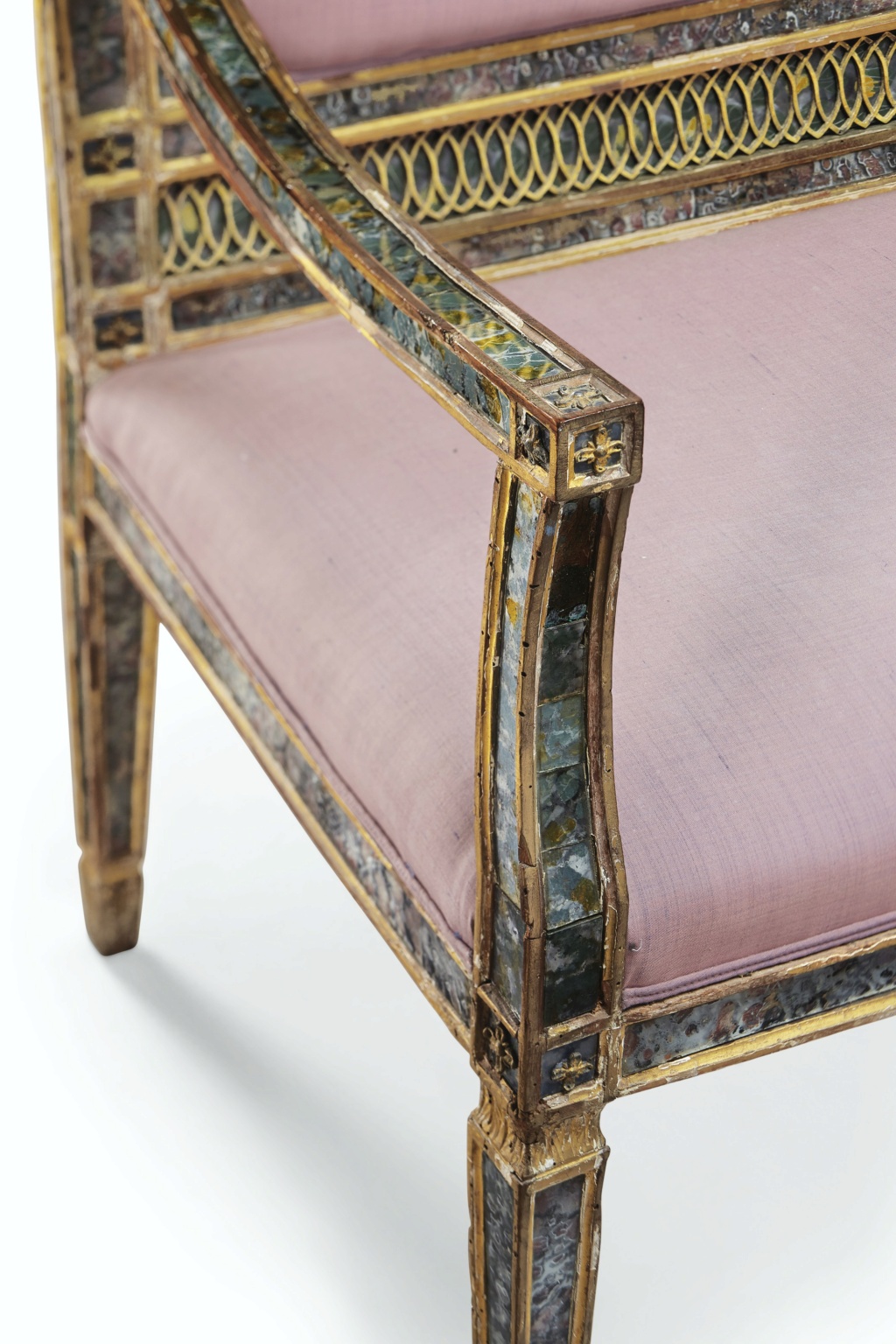
Images : Christie's
Lot Essay
With reverse-painted glass panels painted in imitation of various hardstones including Sicilian jasper in reds, yellows and greens, and lapis lazuli, this settee and four chairs are part of the celebrated suite reputedly made for the Prince of Palagonia for the Drawing Room of the Villa Palagonia at Bagheria, near Palermo, Sicily.
However, as A. Gonzalez-Palacios noted in his ‘The Prince of Palagonia, Goethe and Glass Furniture’, Burlington Magazine, August 1971, the monogram does not correspond with the prince’s initials and may emanate from a different commission.
The Sicilian origin, however, seems to be validated by the closely related suite of furniture made for La Favorita, the pavilion built for King Ferdinand IV near Palermo circa 1799.
Although confirmation of the original commission still remains a mystery, the precious quality of the labor intensive construction points to a likely commission by a powerful and wealthy Sicilian family as display pieces.
The suite was subsequently bought by the Earl of Derby circa 1910 from Lenygon’s for Derby House, Stratford Place, London.(...)
A PAIR OF SOUTH ITALIAN GILTWOOD, GILT-LEAD MOUNTED AND REVERSE-PAINTED GLASS SIDE CHAIRS
SICILY, CIRCA 1780
Each with an inset paneled toprail with central breakfront cypher table with the initials 'PPL', above a canted rectangular padded seatback and conforming seat above a paneled seatrail on rosette-headed square tapering legs with foliate capitals and feet
Provenance : possibly supplied for Don Francesco Ferdinando Gravina, Prince of Palagonia (1722-1789).
(...)
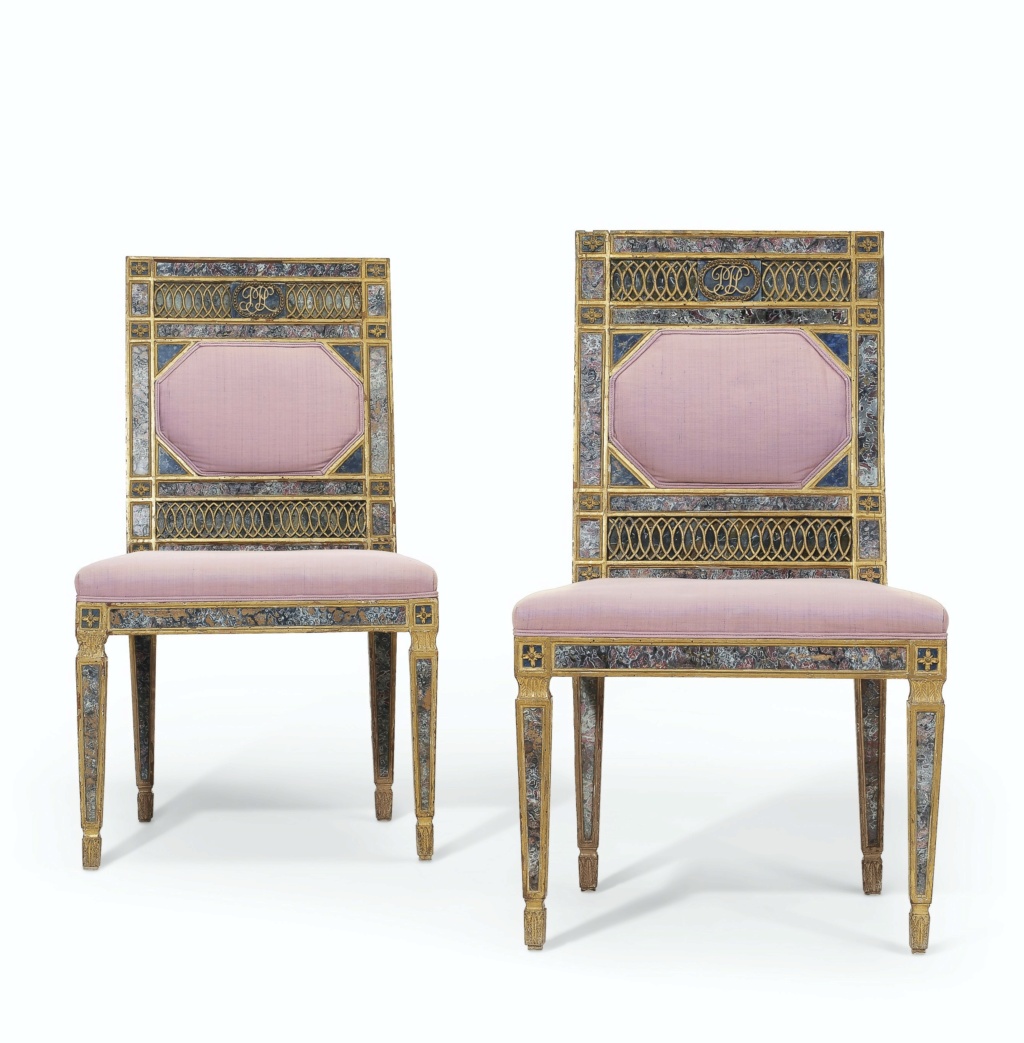
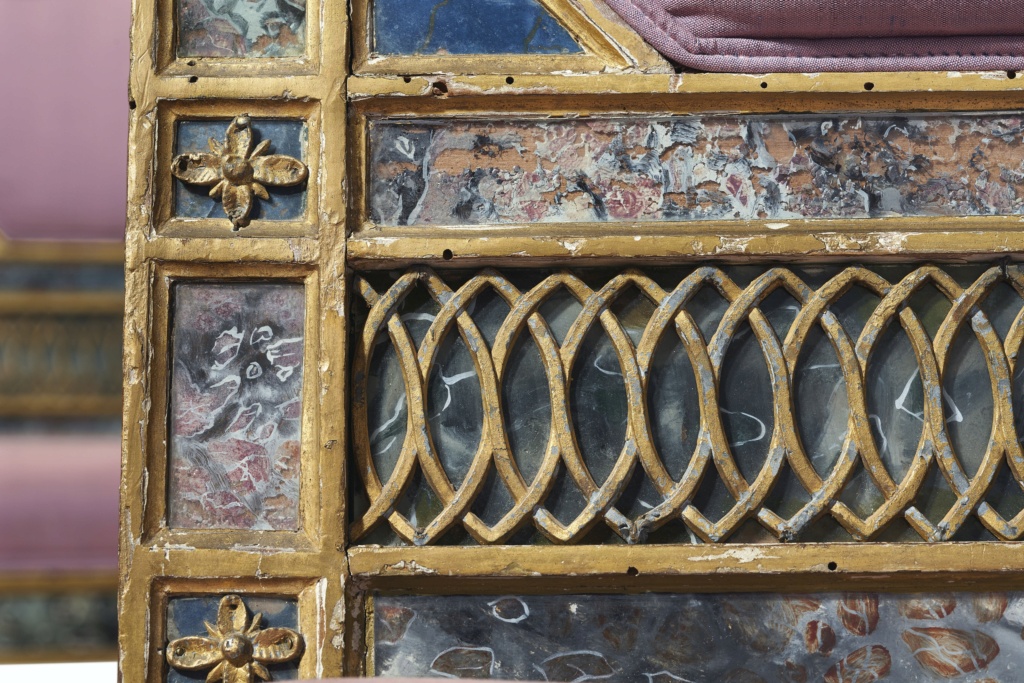

Images : Christie's
A PAIR OF SOUTH ITALIAN GILTWOOD, GILT-LEAD MOUNTED AND REVERSE-PAINTED GLASS SIDE CHAIRS
SICILY, CIRCA 1780
Each with an inset paneled toprail with central breakfront cypher table with the initials 'PPL', above a canted rectangular padded seatback and conforming seat above a paneled seatrail on rosette-headed square tapering legs with foliate capitals and feet
Provenance : possibly supplied for Don Francesco Ferdinando Gravina, Prince of Palagonia (1722-1789).
(...)
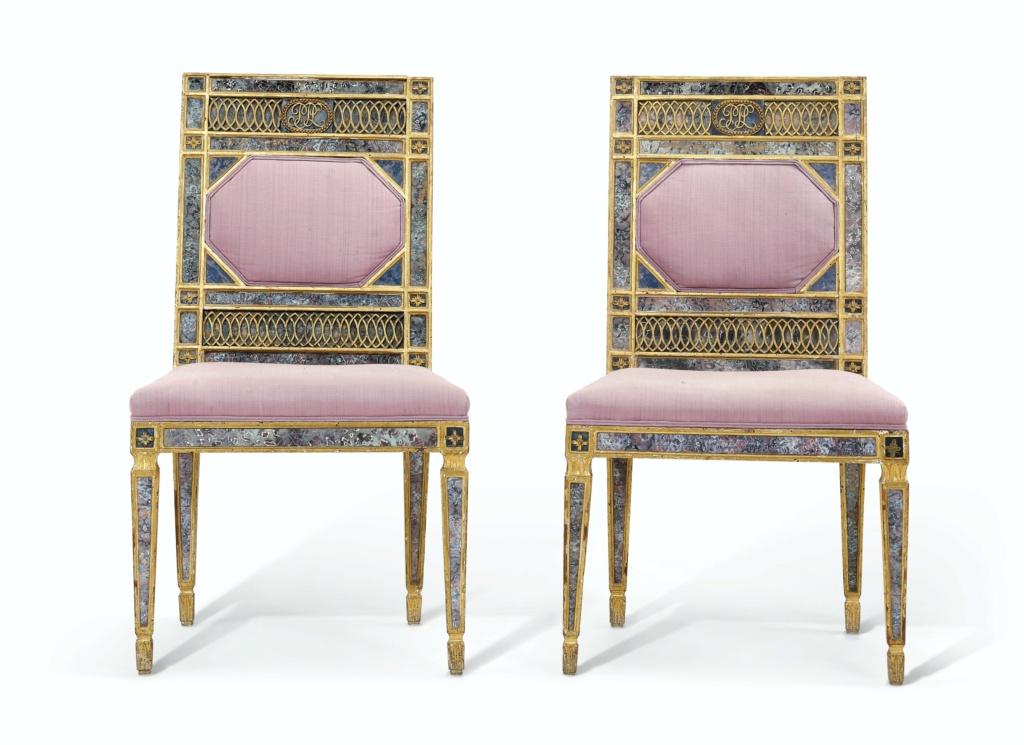

Images : Christie's
* Source et infos complémentaires : Christie's New York - Sacred and Imperial, The James and Marilynn Alsdorf Collection Part II
_________________________
Ravissant ensemble mobilier décoré de plaques de verre, peintes sur l'envers, à l'imitation du marbre et de pierres fines !

Christie's a écrit:(...) reputedly made for the Prince of Palagonia for the Drawing Room of the Villa Palagonia at Bagheria, near Palermo, Sicily.
Enquête illustrée, à suivre...

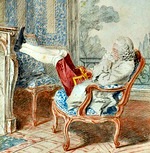
La nuit, la neige- Messages : 18137
Date d'inscription : 21/12/2013
 Re: La villa Palagonia ou la villa des monstres (Sicile)
Re: La villa Palagonia ou la villa des monstres (Sicile)
Avant de mettre un pied dans la villa Palagonia de Bagheria citons encore deux textes qui évoquent le lieu d'origine présumé de meubles similaires. 
 Sont conservés au Metropolitan Museum de New York, qui date leur fabrication une décennie plus tard que précédemment :
Sont conservés au Metropolitan Museum de New York, qui date leur fabrication une décennie plus tard que précédemment :



Triple-back settee (part of a set)
Carved, gilded and painted walnut, reverse painted glass, cut and voided 17th-century crimson velvet
Italian, Sicily
c. 1790 / 1800
Image : The Metropolitan Museum of Art
Présentation du musée :
This settee is from a large set of seat furniture, which included at least four settees and twenty side chairs. It was formerly thought to have been commissioned for the Villa Palagonia at Bagheria near Palermo, but the provenance remains undocumented, and the initials in the cipher at the center of the back, "PPL," are as yet unidentified. The reverse-painted glass panels in imitation of agate, lapis, and marble are a distinctive feature often used on late-eighteenth-century Neoclassical Sicilian furniture.

Side chair (part of a set)
Italian, Sicily
c. 1790 / 1800
Image : The Metropolitan Museum of Art
Présentation du musée (extraits) :
The gilded moldings and carved decoration on this chair and a matching settee frame reverse-painted glass panels, which imitate in different colors the hardstones agate, marble, and lapis lazuli.
Close inspection reveals the high quality and intriguingly delicate structure of the paint and the fragility of the panels, which is not evident at first glance. That the chair and settee have survived in such good condition is testimony to the technical skills of the maker, who provided a sound base for the heavy glass strips, preventing them from peeling away over time. Nevertheless, these are display pieces that were clearly not intended for regular use.
The smallest body movement of a user or any attempt to shift or lift the heavy objects puts divergent forces and pressure on their ostentatious "skin."
The Museum's chair and settee are part of a large suite that originally consisted of at least four settees and twenty side chairs.

Image : The Metropolitan Museum of Art
Early in the twentieth century the set was in the collection of the earl of Derby, at Derby House, London, from where it was sold in 1940 to Mrs. Violet van der Elst, also of London. The pieces were dispersed in 1948.
At that time, all items of the suite were covered with the bold red and gold baroque-cut velvet that still decorates the Museum's pieces.

Image : The Metropolitan Museum of Art
For many years it was assumed that the initials "PPL" displayed in a medallion on the backs referred to the Villa Palagonia in Bagheria, near Palermo, and, more specifically, to a member of the illustrious Gravina family as a patron; however, as James David Draper pointed out, although "the peculiarly Sicilian penchant for fashioning an overall look out of glass was most memorably given free rein at the Villa Palagonia, . . . the initials 'PPL' . . . do not correspond with those of any prince of Palagonia and in truth the pieces have a much more pronounced neo-classical severity than the Villa Palagonia ballroom."

Image : The Metropolitan Museum of Art
John Richardson, the donor of the Museum's pieces, which he had acquired on the London art market, kept them at one point in the Château de Castille in Provence, the home of the Cubist scholar Douglas Cooper, who himself owned at least three chairs from the set.
For the moment, the original location of the suite remains a mystery, although the preciousness and labor-intensive nature of the work narrows the source of the commission to one of the great, prosperous, aristocratic families of Sicily.
The back of the settee is tripartite; the medallion with initials appears at the top of the center section, but in the same place on the side sections there is a military trophy in the form of a helmet superimposed on a saber. There is a gilded openwork frieze of overlapping ellipses along the top of the back of both the chair and the settee; this appears also along the bottom of the back of the settee but not on the Museum's chair. These ellipses, rather freely adapted from ancient vase paintings, reflect the so-called Etruscan fashion of the last third of the eighteenth century.
A very similar pair of chairs, each, however, with an octagonal verre églomisé panel set into the back in place of upholstery, is part of the collection of Juan March Ordinas at Palau March in Palma de Mallorca. That those panels show a mythological chariot in the manner of an ancient vase painting is also very much in the "Etruscan" style. The incorporation of glass panels in the center of the backs makes the March chairs even more fragile than the Derby House suite.
Other pieces from this suite are preserved in the Art Institute of Chicago (two chairs), the Ringling Museum of Art, Sarasota, Florida (two settees and two chairs), and the Museum für Kunsthandwerk, Frankfurt am Main (one chair), as well as in various private collections.
Some of them have been recovered in shell pink or blue gray fabric with the intention of intensifying the effect of the same shades painted on the glass.
Text : Wolfram Koeppe 2006
Source : The Metmuseum
 Autre piste, celle d'une précédente vente aux enchères, organisée par Sotheby's Londres. Il s'agit cette fois-ci d'une console, elle aussi décorée avec des plaques de verres peintres en trompe-l'oeil.
Autre piste, celle d'une précédente vente aux enchères, organisée par Sotheby's Londres. Il s'agit cette fois-ci d'une console, elle aussi décorée avec des plaques de verres peintres en trompe-l'oeil.
La villa Palagonia est à nouveau évoquée...
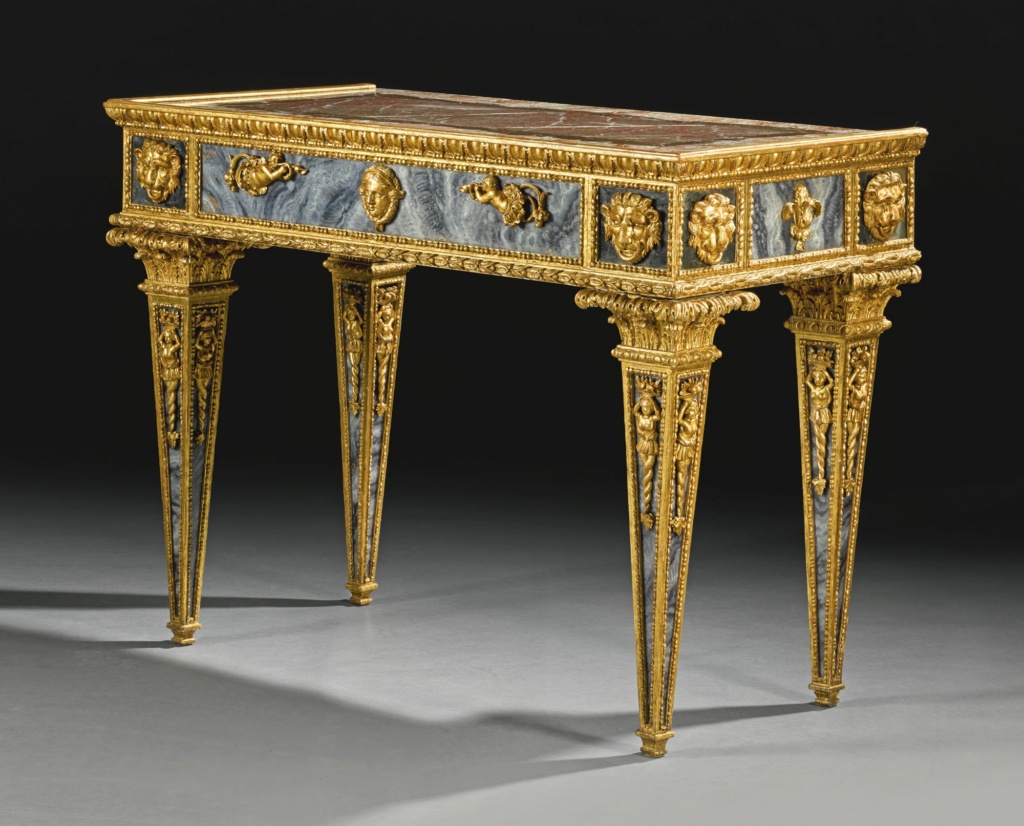
An Italian Neoclassical Giltwood and Reverse Painted Glass Console Table, Sicilian
Late 18th Century
with a rectangular Rosso Levanto and Breccia Pernice marble top surrounded on three sides by a giltwood border, on an egg-and-dart moulding above a bead-and-reel framed frieze inset with reverse painted glass panels imitating gilt-veined onyx, the corners with giltwood lion masks, the central panel with a female head flanked by two horn-blowing putti, the sides centred by fleur-de-lys, on a laurel frieze raised on square tapering legs surmounted with Corinthian capitals, inset with further reverse painted glass panels with gilt female terms.
93cm. high, 126cm. wide, 65.5cm. deep; 3ft. ¾in., 4ft. 1¾in., 2ft. 2in.
Image : Sotheby's
Présentation (extraits) :
The present console table, formerly at Mereworth Castle, Kent is an excellent example of a type of reverse glass painted furniture particularly favoured by the Sicilian aristocracy of the late 18th century.
It is one of four identical console tables that left their original location at an unknown date; one of which is now at the Victoria & Albert Museum, London, with a second at Temple Newsam House, Leeds, and a third one formerly also in the collection of Lady Anne Tree as a pair to ours.
(...)
These four console tables were almost certainly part of a larger suite of furniture most probably commissioned for an important residence in Palermo.
(...)

Image : Sotheby's
Painted glass seeking to emulate marble is characteristic of Southern Neoclassicism, and stems from the long-established custom of faux-marble painted wood furniture. Instead of applying a gold leaf to the glass, as in the original verre églomisé technique, Sicilian artisans would cleverly use marbled paper and lacquered dyes.
(...)
THE MYTH SURROUNDING VILLA PALAGONIA
The Villa Palagonia in Bagheria, near Palermo, Sicily, is among the earliest and finest examples of Sicilian Baroque. It was built from 1715 for Don Ferdinando Gravina, 5th Prince of Palagonia, by the architect Tommaso Maria Napoli (1659-1725), who also designed the nearby Villa Valguarnera.
Around 1749 the eccentric 7th Prince began adding much of its famous decoration of grotesques, fantastic animals, and other creatures. Subsequently his brother, Salvatore Gravina, designed the mirrored ballroom that in the years to come would fascinate many a distinguished traveller of the Grand Tour.
In his Italienische Reise (1787), Goethe commented upon the interiors:
'An exact imitation of these [agates], produced by coating the back side of thin glass panes with lacquer dyes, was the only sensible thing I saw in the Palagonia madhouse. They have more decorative effect than windows made with true agate, because instead of having to piece together many small stones, the architect can make the panes any size he likes.'
As the reverse painted glass technique described by Goethe and other visitors is clearly the same, a number of pieces have traditionally been given a Palagonia provenance.
However, little is known about the long-vanished furnishings originally commissioned for the villa, apart from the fact that they were remarkably peculiar.
As confirmed by scholars such as Alvar González-Palacios, (1971, p. 385) and James David Draper (1994, p. 23), there is no proof to support this attribution, not least because the aspect of much Sicilian furniture of this kind, including our table and the chairs mentioned above, is markedly Neoclassical, and could hardly have been designed for such a late-Baroque residence.
(...)
* Source : Sotheby's - Treasures Sale, 2016
A suivre...



Triple-back settee (part of a set)
Carved, gilded and painted walnut, reverse painted glass, cut and voided 17th-century crimson velvet
Italian, Sicily
c. 1790 / 1800
Image : The Metropolitan Museum of Art
Présentation du musée :
This settee is from a large set of seat furniture, which included at least four settees and twenty side chairs. It was formerly thought to have been commissioned for the Villa Palagonia at Bagheria near Palermo, but the provenance remains undocumented, and the initials in the cipher at the center of the back, "PPL," are as yet unidentified. The reverse-painted glass panels in imitation of agate, lapis, and marble are a distinctive feature often used on late-eighteenth-century Neoclassical Sicilian furniture.

Side chair (part of a set)
Italian, Sicily
c. 1790 / 1800
Image : The Metropolitan Museum of Art
Présentation du musée (extraits) :
The gilded moldings and carved decoration on this chair and a matching settee frame reverse-painted glass panels, which imitate in different colors the hardstones agate, marble, and lapis lazuli.
Close inspection reveals the high quality and intriguingly delicate structure of the paint and the fragility of the panels, which is not evident at first glance. That the chair and settee have survived in such good condition is testimony to the technical skills of the maker, who provided a sound base for the heavy glass strips, preventing them from peeling away over time. Nevertheless, these are display pieces that were clearly not intended for regular use.
The smallest body movement of a user or any attempt to shift or lift the heavy objects puts divergent forces and pressure on their ostentatious "skin."
The Museum's chair and settee are part of a large suite that originally consisted of at least four settees and twenty side chairs.

Image : The Metropolitan Museum of Art
Early in the twentieth century the set was in the collection of the earl of Derby, at Derby House, London, from where it was sold in 1940 to Mrs. Violet van der Elst, also of London. The pieces were dispersed in 1948.
At that time, all items of the suite were covered with the bold red and gold baroque-cut velvet that still decorates the Museum's pieces.

Image : The Metropolitan Museum of Art
For many years it was assumed that the initials "PPL" displayed in a medallion on the backs referred to the Villa Palagonia in Bagheria, near Palermo, and, more specifically, to a member of the illustrious Gravina family as a patron; however, as James David Draper pointed out, although "the peculiarly Sicilian penchant for fashioning an overall look out of glass was most memorably given free rein at the Villa Palagonia, . . . the initials 'PPL' . . . do not correspond with those of any prince of Palagonia and in truth the pieces have a much more pronounced neo-classical severity than the Villa Palagonia ballroom."

Image : The Metropolitan Museum of Art
John Richardson, the donor of the Museum's pieces, which he had acquired on the London art market, kept them at one point in the Château de Castille in Provence, the home of the Cubist scholar Douglas Cooper, who himself owned at least three chairs from the set.
For the moment, the original location of the suite remains a mystery, although the preciousness and labor-intensive nature of the work narrows the source of the commission to one of the great, prosperous, aristocratic families of Sicily.
The back of the settee is tripartite; the medallion with initials appears at the top of the center section, but in the same place on the side sections there is a military trophy in the form of a helmet superimposed on a saber. There is a gilded openwork frieze of overlapping ellipses along the top of the back of both the chair and the settee; this appears also along the bottom of the back of the settee but not on the Museum's chair. These ellipses, rather freely adapted from ancient vase paintings, reflect the so-called Etruscan fashion of the last third of the eighteenth century.
A very similar pair of chairs, each, however, with an octagonal verre églomisé panel set into the back in place of upholstery, is part of the collection of Juan March Ordinas at Palau March in Palma de Mallorca. That those panels show a mythological chariot in the manner of an ancient vase painting is also very much in the "Etruscan" style. The incorporation of glass panels in the center of the backs makes the March chairs even more fragile than the Derby House suite.
Other pieces from this suite are preserved in the Art Institute of Chicago (two chairs), the Ringling Museum of Art, Sarasota, Florida (two settees and two chairs), and the Museum für Kunsthandwerk, Frankfurt am Main (one chair), as well as in various private collections.
Some of them have been recovered in shell pink or blue gray fabric with the intention of intensifying the effect of the same shades painted on the glass.
Text : Wolfram Koeppe 2006
Source : The Metmuseum
La villa Palagonia est à nouveau évoquée...

An Italian Neoclassical Giltwood and Reverse Painted Glass Console Table, Sicilian
Late 18th Century
with a rectangular Rosso Levanto and Breccia Pernice marble top surrounded on three sides by a giltwood border, on an egg-and-dart moulding above a bead-and-reel framed frieze inset with reverse painted glass panels imitating gilt-veined onyx, the corners with giltwood lion masks, the central panel with a female head flanked by two horn-blowing putti, the sides centred by fleur-de-lys, on a laurel frieze raised on square tapering legs surmounted with Corinthian capitals, inset with further reverse painted glass panels with gilt female terms.
93cm. high, 126cm. wide, 65.5cm. deep; 3ft. ¾in., 4ft. 1¾in., 2ft. 2in.
Image : Sotheby's
Présentation (extraits) :
The present console table, formerly at Mereworth Castle, Kent is an excellent example of a type of reverse glass painted furniture particularly favoured by the Sicilian aristocracy of the late 18th century.
It is one of four identical console tables that left their original location at an unknown date; one of which is now at the Victoria & Albert Museum, London, with a second at Temple Newsam House, Leeds, and a third one formerly also in the collection of Lady Anne Tree as a pair to ours.
(...)
These four console tables were almost certainly part of a larger suite of furniture most probably commissioned for an important residence in Palermo.
(...)

Image : Sotheby's
Painted glass seeking to emulate marble is characteristic of Southern Neoclassicism, and stems from the long-established custom of faux-marble painted wood furniture. Instead of applying a gold leaf to the glass, as in the original verre églomisé technique, Sicilian artisans would cleverly use marbled paper and lacquered dyes.
(...)
THE MYTH SURROUNDING VILLA PALAGONIA
The Villa Palagonia in Bagheria, near Palermo, Sicily, is among the earliest and finest examples of Sicilian Baroque. It was built from 1715 for Don Ferdinando Gravina, 5th Prince of Palagonia, by the architect Tommaso Maria Napoli (1659-1725), who also designed the nearby Villa Valguarnera.
Around 1749 the eccentric 7th Prince began adding much of its famous decoration of grotesques, fantastic animals, and other creatures. Subsequently his brother, Salvatore Gravina, designed the mirrored ballroom that in the years to come would fascinate many a distinguished traveller of the Grand Tour.
In his Italienische Reise (1787), Goethe commented upon the interiors:
'An exact imitation of these [agates], produced by coating the back side of thin glass panes with lacquer dyes, was the only sensible thing I saw in the Palagonia madhouse. They have more decorative effect than windows made with true agate, because instead of having to piece together many small stones, the architect can make the panes any size he likes.'
As the reverse painted glass technique described by Goethe and other visitors is clearly the same, a number of pieces have traditionally been given a Palagonia provenance.
However, little is known about the long-vanished furnishings originally commissioned for the villa, apart from the fact that they were remarkably peculiar.
As confirmed by scholars such as Alvar González-Palacios, (1971, p. 385) and James David Draper (1994, p. 23), there is no proof to support this attribution, not least because the aspect of much Sicilian furniture of this kind, including our table and the chairs mentioned above, is markedly Neoclassical, and could hardly have been designed for such a late-Baroque residence.
(...)
* Source : Sotheby's - Treasures Sale, 2016
A suivre...


La nuit, la neige- Messages : 18137
Date d'inscription : 21/12/2013
 Re: La villa Palagonia ou la villa des monstres (Sicile)
Re: La villa Palagonia ou la villa des monstres (Sicile)
Le mobilier italien est toujours assez ... original, nonobstant une grande qualité de sculpture.

Lucius- Messages : 11656
Date d'inscription : 21/12/2013
Age : 33
 Re: La villa Palagonia ou la villa des monstres (Sicile)
Re: La villa Palagonia ou la villa des monstres (Sicile)
Quoique j'aime énormément cette décoration de plaques de verre, peintes sur l'envers, à l'imitation du marbre et de pierres fines ( tu nous fais toujours des trouvailles incroyables !!!

Villa des monstres ?!
Sa notoriété auprès du public lui vient principalement des statues de monstres à figure humaine qui ornent son jardin et lui valent le surnom de « Villa des Monstres » (Villa dei Mostri).

Je m'y suis offert une petite escapade, grâce à Google-images, qui m'a laissée pantelante d'admiration !

Ce doit être absolument somptueux !!!
Nous feras-tu un petit reportage, cher la nuit, la neige ?
_________________
... demain est un autre jour .
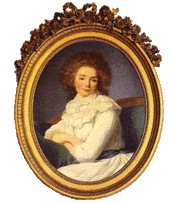
Mme de Sabran- Messages : 55508
Date d'inscription : 21/12/2013
Localisation : l'Ouest sauvage
 Re: La villa Palagonia ou la villa des monstres (Sicile)
Re: La villa Palagonia ou la villa des monstres (Sicile)
Bien sûr. C'est en cours de préparation...Mme de Sabran a écrit:
Nous feras-tu un petit reportage, cher la nuit, la neige ?


La nuit, la neige- Messages : 18137
Date d'inscription : 21/12/2013
 Re: La villa Palagonia ou la villa des monstres (Sicile)
Re: La villa Palagonia ou la villa des monstres (Sicile)
Ah, que j'en suis ravie ! Merci !!!

_________________
... demain est un autre jour .

Mme de Sabran- Messages : 55508
Date d'inscription : 21/12/2013
Localisation : l'Ouest sauvage
 Sujets similaires
Sujets similaires» Louis-François-Armand de Vignerot du Plessis, maréchal et duc de Richelieu
» Un bonjour de Catane, Sicile...
» Un beau-frère de Marie-Antoinette : Ferdinand IV , roi de Sicile
» Marie-Caroline d'Autriche, reine de Naples et de Sicile
» Portraits de Marie-Caroline d'Autriche, reine de Naples et de Sicile
» Un bonjour de Catane, Sicile...
» Un beau-frère de Marie-Antoinette : Ferdinand IV , roi de Sicile
» Marie-Caroline d'Autriche, reine de Naples et de Sicile
» Portraits de Marie-Caroline d'Autriche, reine de Naples et de Sicile
Page 1 sur 1
Permission de ce forum:
Vous ne pouvez pas répondre aux sujets dans ce forum